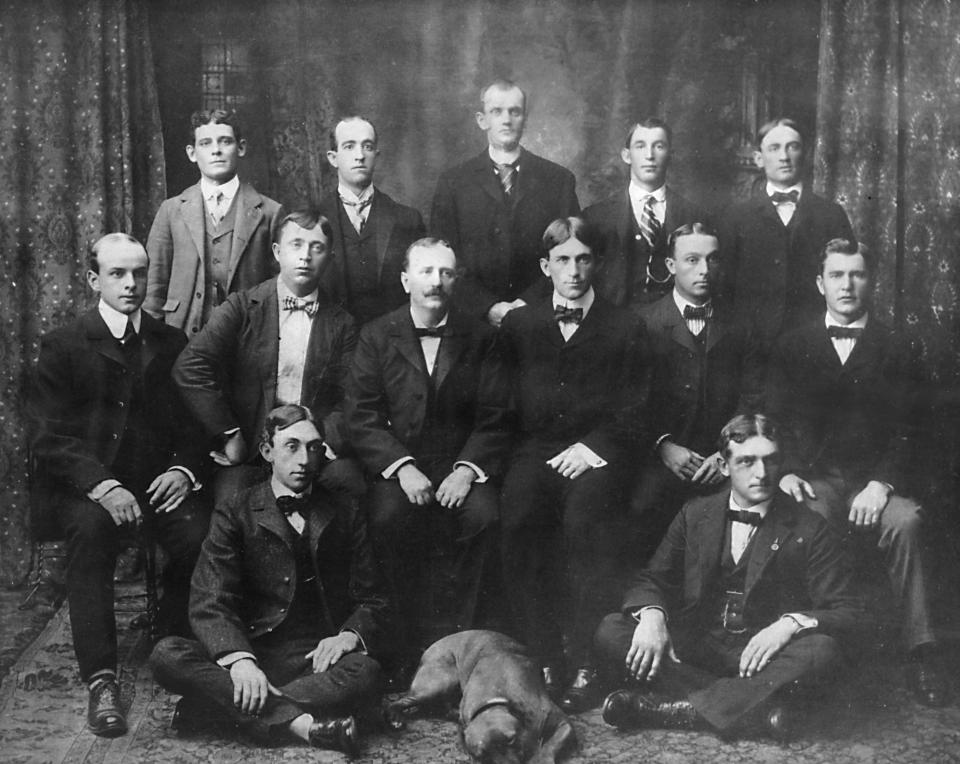Mohawk Valley History: Public golf courses, DAR awards
- Oops!Something went wrong.Please try again later.
- Oops!Something went wrong.Please try again later.
1927, 97 years ago
What's in a name?
Nearly 2,300 babies were born in Utica in 1926 and 56 were named "Mary" and 64 were named "John."

Other popular names included: 41 Bettys, 37 Beverlys and 29 Shirleys. There were 48 Roberts, 39 Edwards, 33 Williams, 25 Jameses and 22 Georges. Not an Elvis in the bunch.
1924, 100 years ago
Public golf
Many cities smaller than Utica have public golf courses. Utica -- with a population of 105,000 -- has none. Members of the Utica Park Board wants to build one in Roscoe Conkling Park.
They say, "Many men and women who enjoy golf can't afford to join a private club. A public course would solve their problem." (The Valley View golf course later was built in the park,)
1949, 75 years ago
Lions Club
F. B. Grotevant is named chairman of the Lions Club of Utica's 25th anniversary celebration. The club was organized on Feb. 21, 1924, and chartered by Lions International on Oct. 1, 1924.
1974, 50 years ago
Sherrill mayor
Gordon Silsby is selected as mayor of the city of Sherrill in Oneida County. He replaces James Graves, who resigned from the post because of outside responsibilities.
Bob King is named head football coach at Hamilton College. He once coached at Thomas R. Proctor and John F. Kennedy high schools in Utica.
Republican Russell Williams, of North Utica, is re-elected to a fourth term as chairman of the Oneida County Board of Legislators.
1999, 25 years ago
DAR awards
The Holland Patent chapter of the National Society of the Daughters of the American Revolution gives its "good citizen" award to two high school students: Louise Blake of Floyd and Holland Patent schools, and Dustin Freeley of Remsen and Remsen schools.
Area Republican Congressman Sherwood Boehlert is re-elected chairman of the House of Representatives Transportation Committee's subcommittee on water resources and the environment. He also serves on the Science Committee and the Permanent Select Committee on Intelligence.
2014, 10 years ago
Police retirements
Five Utica police officers -- each with more than 20 years' experience -- have retired. They are Captain Wayne Manolescu, Captain James Watson, Lieutenant Stephen Brucker, Lieutenant Scott Cifonelli and Sergeant Loriann Cozza.
In high school boys basketball, Holland Patent defeats Clinton, 68-52. Logan Reinold scores 24 points and has seven assists for the winners and Matt Harter adds 22 points and nine rebounds. Clinton is led by Malaquias Canery with 25 points and Andrew Taft with 15.
Organizers of the local America's Greatest Heart Run and Walk set this year's goal at $1,133,000. It will held on February 28 and March 1 in the Harold T. Clark Jr. Athletic Center at Utica College (today Utica University).
Trivia quiz
I'll name the events; you name the U.S. presidents at the time. (1) the Mexican War, (2) the Spanish-American War, (3) Orville and Wilbur Wright launch the air age when they fly the first airplane at Kitty Hawk, North Carolina, (4) The Gadsden Purchase of land from Mexico for $10 million adds Arizona and New Mexico to the United States, (5) Alexander Bell invents the telephone. (Answers will appear here next week.)
Answer to last week's question: In the presidential election of 1824, Andrew Jackson won the popular vote and the electoral vote, but was not sworn in as president. In the popular vote, Jackson got 153,544; John Quincy Adams 108,740; William Crawford 47,136 and Henry Clay 46,618. Jackson also won the electoral vote: Jackson 99 votes and 11 states, Adams 84 votes and 7 states, Crawford 41 votes and 3 states, and Clay 37 votes and 3 states. Since no candidate received a majority of the electoral votes, the House of Representatives had to choose a president from the top three candidates. The House chose Adams to be the sixth president of the United States. Jackson was elected president four years later.
This Week in History is researched and written by Frank Tomaino. E-mail him at ftomaino221@gmail.com.
This article originally appeared on Observer-Dispatch: Police retirements, mayors: A look back at Mohawk Valley history

